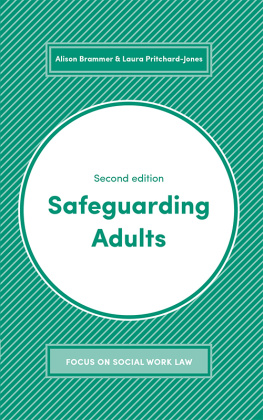Safeguarding Children from Abroad
Refugee, Asylum Seeking and Trafficked Children in the UK
Edited by Emma Kelly and Farhat Bokhari
Foreword by Brigid Daniel
Jessica Kingsley Publishers
London and Philadelphia
Figure 2.1 reproduced with permission of The London Safeguarding Children Board.
First published in 2012
by Jessica Kingsley Publishers
116 Pentonville Road
London N1 9JB, UK
and
400 Market Street, Suite 400
Philadelphia, PA 19106, USA
www.jkp.com
Copyright Jessica Kingsley Publishers 2012
Foreword copyright Brigid Daniel 2012
All rights reserved. No part of this publication may be reproduced in any material form (including photocopying or storing it in any medium by electronic means and whether or not transiently or incidentally to some other use of this publication) without the written permission of the copyright owner except in accordance with the provisions of the Copyright, Designs and Patents Act 1988 or under the terms of a licence issued by the Copyright Licensing Agency Ltd, Saffron House, 610 Kirby Street, London EC1N 8TS. Applications for the copyright owners written permission to reproduce any part of this publication should be addressed to the publisher.
Warning: The doing of an unauthorised act in relation to a copyright work may result in both a civil claim for damages and criminal prosecution.
Library of Congress Cataloging in Publication Data
A CIP catalog record for this book is available from the Library of Congress
British Library Cataloguing in Publication Data
A CIP catalogue record for this book is available from the British Library
ISBN 978 1 84905 157 6
eISBN 978 0 85700 559 5
Converted to eBook by EasyEPUB
Foreword
This book reminds us of one of the universal needs of children and young people the need for a secure attachment relationship that offers age-appropriate nurture, care, encouragement, support and love. The loss of, or separation from a key attachment figure is known to be one of the most traumatic and damaging human experiences that can impact throughout life. By advocating for the use of the term separated children to describe a range of ways in which children and young people end up alone in the UK this book foregrounds this basic human need. In particular, the book draws on attachment theory to analyse the ways in which children and young people may bring with them patterns of insecure attachment that are likely to impact on their formal and informal relationships once here.
The children and young people who find themselves in the UK, for whatever reason, without a parent or carer are thus humanised in this book. We are reminded that they have the same developmental needs as all children and young people. At the same time these fundamental, universal needs are overlaid with additional needs because of their experiences in their countries of origin, during the journey here and once in the UK. The needs of each individual will therefore be very different each young person will have their own powerful story to tell.
This book is aimed at all practitioners who may encounter separated children and young people which could mean any number of disciplines and professions in any, and all, of child and adult services. The children and young people may directly seek help in their own right, but they are more likely to come to the attention of someone in a position to help if practitioners are curious and interested enough to notice their needs.
The book is highly practical and combines theoretical insight with clear advice and guidance. The legislative context is described in detail, including information about Scotland, and there is much information about how the legislation can be used to underpin the provision of help for these young people. It is such a complex area that a clear exposition of the policy and legislative context is invaluable.
The book also addresses, head on, some of the problematic areas, most notably issues of age determination. This is a fraught area for practitioners and can deflect attention away from the basic fact that one is faced with an individual who is in need of support. The process of age assessment is carefully explained here. Another fraught area, that is also dealt with sensitively and clearly, is that of return of children and young people to their country of origin.
The book also explores the ways in which separated children and young peoples sense of security can be enhanced by having a supported place to live, being listened to and receiving appropriate mental health care. If we can provide these children and young people with the kind of support, encouragement and empathic care that they need, we will maximise the chances of them being able to settle, flourish and make their own contribution to the rich diversity of the UK.
Brigid Daniel,
Professor of Social Work,
University of Stirling, UK
Introduction
Emma Kelly and Farhat Bokhari
Throughout the UK, practitioners are working with children from abroad who are alone in the country. In some areas such work has become almost routine, reflecting the large numbers of children from abroad, whereas in others, only one or two such children are encountered every year. Skills and knowledge therefore range from well-developed expertise with teams and specialist professionals dedicated to safeguarding children from abroad to individual practitioners developing an independent knowledge base, often relying on the internet (Kelly 2009) to respond to new issues and needs. This book offers detailed information for anyone who may work to safeguard and promote the welfare of children from abroad.
Separated children
Previously, we have lacked the language to describe the wide range of children that arrive from abroad in the UK. Only a few of these children will be unaccompanied asylum seeking children (UASC); many others will enter the UK accompanied and then be abandoned or be cared for by a stranger, and other children will be from elsewhere in the European Union (EU). In mainland Europe the term separated children is used to describe this diverse group of children and it is a term that the UK would do well to adopt. A separated child is:
under 18 years of age, outside their country of origin and separated from both parents, or their previous legal, or customary primary caregiver. Some children are totally alone while others, who are also the concern of the SCEP, may be living with extended family members who are not necessarily their customary or primary caregivers. All such children are separated children and entitled to international protection under a broad range of international and regional instruments. (SCEP 2010, p.3)
The Separated Children in Europe Programme (SCEP), established by the United Nations High Commissioner for Refugees (UNHCR) and International Save the Children Alliance, was established in 1998 and introduced its Statement of Good Practice in 1999. This statement is based on the United Nations Convention on the Rights of the Child (UNCRC) and the UNHCRs (1997) Guidelines on Policies and Procedures in Dealing with Unaccompanied Children Seeking Asylum (see Halvorsen 2002). In the statement it establishes that:





